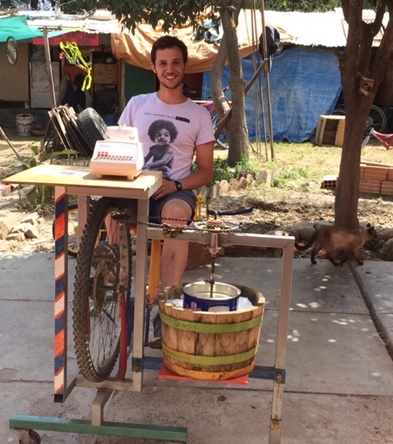In July 2015, the Institution awarded John Venner a £2,000 Overseas and Developing World Engineering Project Award to help him undertake a volunteer work placement in Bolivia.
An Affiliate member of the Institution, he is back studying Mechanical Engineering with Advanced Design & Innovation at the University of Bath, after finishing the placement.
John said: “Following an industrial placement as part of my degree, I was keen to spend some time in a developing country putting my engineering skills to use.
“I found CECAM, a small charity in Bolivia run by a Bolivian man, who took about 10 volunteers a year to work with local charities. Some of these were schools and hospitals, but I was chosen for my engineering skills.”
He originally planned to work on solar ovens. Many Bolivian households cook inside their homes using wood as fuel, which contributes to deforestation, causes pollution and is inefficient. The new solar ovens would improve living conditions and reduce costs, to their users and the environment.

However, when he got to Bolivia he got involved in other projects.
John said: “I was talking to the leader of CECAM, Freddie Candia, and discussing my part time job at home in Halfords. He (wrongly) assumed I was a bicycle expert and diverted me on to a project reusing old bicycles!”
There are lots of old, abandoned bicycles in Bolivia and the sound parts were used to make new machines, or recombined to produce a new bicycle.
John was also involved in an eco-bathroom project which allowed schools to recycle waste into fertiliser, using ash and rubbish and no water.

Reflecting on what he had learnt from his time in Bolivia, John said: “I was working with my hands, using nuts and bolts, angle grinders and lathes, from 8am to 7pm Monday to Friday for two months so, of course, my practical skills improved significantly. Working on any project with limited resources means you have to be creative.
"Also, my Spanish improved significantly. Before I left England I knew next to no Spanish; I received a B at GCSE and hadn’t used it since.
"And finally, travelling to the other side of the world, on my own and working in a demanding job in a foreign language, in a foreign country means that I can cope better with anything that’s thrown at me.”
John has always been interested in maths and physics, and imagined that he would study these subjects at university. But he gradually realised that they were too theoretical and that he would like to be doing something more practical. Engineering seemed to be the answer.
He said: “Engineering is about applying maths, physics and common sense to almost any problem. It is not as far removed from everyday experiences as people imagine.
“I am 100% keen on engineering. I would advise people studying engineering to do as many work placements as possible. Visiting different companies is a real eye opener and it’s important to see what engineering is like in the real world.”
Looking forward, John said it was hard to identify an area of engineering that he would like to specialise in.
He said: “I have thoroughly enjoyed the variety of engineering covered by my course, and during my work placements here and abroad. So I would really like to work in an engineering consultancy. Once I have broadened my experience I would like to work for an NGO on disaster relief.
Visit Sustainable Bolivia more information.
About the Overseas and Developing World Engineering Project Award
 Under the award, members of the Institution can apply for financial support to help them volunteer for engineering projects and activities that assist communities and individuals worldwide.
Under the award, members of the Institution can apply for financial support to help them volunteer for engineering projects and activities that assist communities and individuals worldwide.
They can also apply for financial support to help them undertake personal development activities that help others through engineering.
Activities could include:
- Providing project support for a voluntary project
- Delivering STEM activities
- Supporting environmental projects and educational programmes
The Institution grants awards of up to £2,000. Only members of the Institution are eligible to apply for grants and will need to provide three references to support their application.
Find out
how to apply.